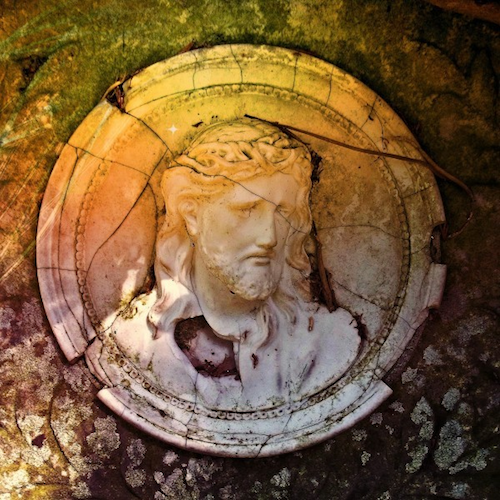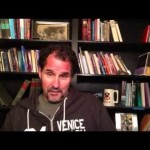We run our website the way we wished the whole internet worked: we provide high quality original content with no ads. We are funded solely by your direct support. Please consider supporting this project.

Overemphasizing Christ?
In response to my work, some have argued that I tend to overemphasize Christ. In light of the claim that in Jesus we have the one and only definitive Word of God and that no previous revelation should ever be placed alongside him or allowed to qualify what he reveals about God, some allege that I am guilty of what is called “Christomonism.” This charge has been leveled against thinkers with increasing frequency these days as more modern bible interpreters and theologians have grown increasingly Christocentric in their theologizing and biblical exegesis.
The curious thing about the charge of “Christomonism” is that, as frequently as the charge is made, there is little consensus on what the term itself means. So far as I’ve been able to determine, there are eight very different theological perspectives that have been associated with this label. “Christomonism” has been used to characterize:
1) Past and present anti-Trinitarian modalism, as one finds today in the “Jesus Only” or “Oneness” Pentecostal movement;
2) Monophysitism, the ancient Christological heresy the sees Jesus as a hybrid mixture of God and humanity;
3) Schools of thought that over-emphasis Christ at the expense of the Holy Spirit;
4) “Christofascism,” a term popularized by Dorothee Sölle;
5) The tendency of some Western preachers who preach “Christ in isolation from God” and who thereby minimize the fatherhood and transcendence of God;
6) The alleged tendency of neo-orthodox theologians such as Barth to reduce all theology to Christology;
7) The view that Christ is the one and only Savior, raised by pluralists against orthodox Christians; and finally;
8) Any who espouse a theology that is more Christocentric than the accuser thinks is appropriate.
In this light, in what sense could the theology and orientation toward the OT that I’ve spelled out in Crucifixion of the Warrior God and other writings be justly labeled “Christomonism”?
I believe my various publications as well as over twenty years of archived sermons suffice in making it clear that I espouse an orthodox Christology (of the Kenotic variety), a robust social Trinitarianism, and a charismatically-inclined emphasis on the Holy Spirit that preclude the first six perspectives being applied to me.
I readily admit I’m guilty of #7, but since this has been the view of the historic-orthodox Church, I feel I’m in very good company.
I also happily confess I am guilty of #8, for I have frankly acknowledged that I believe most theologians are inadequately Christocentric, which implies that I’m more intensely Christocentric than most think is appropriate. At the same time, I have attempted to demonstrate that my Christocentric orientation, and most importantly, my conviction that the revelation of God in Christ should never be synthesized with other previous portraits of God, is reflected in the NT. This, I believe, is the ultimate court of appeal against which all charges of an aberrant theology must be assessed.
I am, in reality, simply trying to work out the hermeneutical implications of the Christocentric orientation that the Church has always confessed, especially as emphasized among the Reformers and even more so as it was embraced by the Anabaptists. As Martin Luther once suggested, we should adopt the mindset of Paul when he said he “resolved to know nothing except Christ crucified” (referring to 1 Cor. 2:2). I believe Luther has it exactly right.
Unfortunately, it seems to me that Luther found a great deal revealed about God in Scripture that wasn’t consistent with what is revealed in the cross. He developed a theology of God’s “masks,” the primary purpose of which was to express God’s action when he’s acting in ways that are inconsistent with what he reveals about himself in Christ. My work is, at its heart, simply my attempt to work out Luther’s conviction consistently and apply it to our interpretation of the OT violent portraits of God.
Photo via Visualhunt
Category: General
Tags: Christocentrism, Crucifixion of the Warrior God, Cruciform Theology, Jesus, Orthodoxy
Topics: Biblical Interpretation
Related Reading

Video Q&A: Do you think Jehovah’s Witnesses and Mormons are saved?
Does Greg believe that everyone goes to Heaven regardless of their beliefs? Find out here.

Podcast: Can a Verse Ever Mean What the Original Author Never Intended It to Mean?
Greg talks about the theological interpretation of scripture in this rapid-paced, controversial episode. http://traffic.libsyn.com/askgregboyd/Episode_0191.mp3

The Rule of Love
The traditional confession that Scriptura sacra sui ipsius interpres (“Sacred Scripture is its own interpreter”) presupposes that there is one divine mind behind Scripture, for example. Moreover, Church scholars have traditionally assumed that Scripture’s unity can be discerned in a variety of concepts, motifs, themes and theologies that weave Scripture together. And to speak specifically of the…

Are the Gospels Historical Fiction?
Some scholars today argue that the stories recorded in the Gospels are actually intentional fabrication. In essence, they argue that Mark took Paul’s theology and robed the story of Jesus in a fictitious historical narrative. The other Gospels followed suit. The argument is clever and removes the difficulty of explaining how a legend of a…

The Twist that Reframes the Whole Story
Many people read the Bible as if everything written within it is equally authoritative. As a result, people read it along the lines of a cookbook. Like a recipe, the meaning and authority of a passage aren’t much affected by where the passage is located within the overall book. The truth, however, is that the…

Podcast: Is Open Theism an Accommodation?
Or for that matter is accommodation an accommodation? Greg talks about things that impact God. http://traffic.libsyn.com/askgregboyd/Episode_0407.mp3
